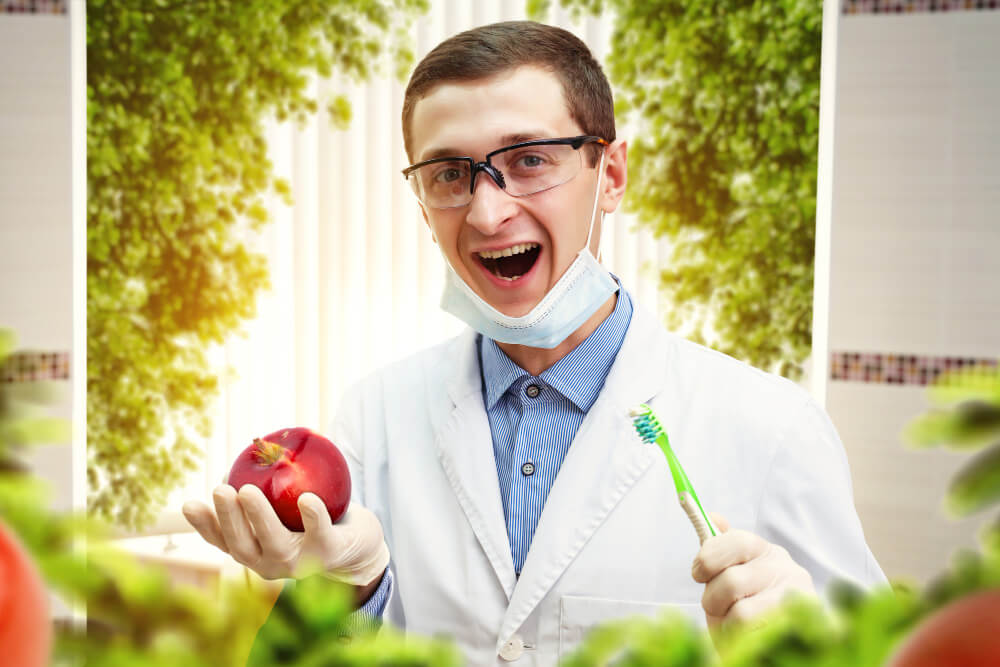Bad breath, or halitosis, is a frustrating and embarrassing affliction. Poor oral hygiene is the usual suspect, but few know that diet plays a significant role in how fresh—and smelly—their mouth tastes. Some foods induce bad breath by stimulating bacteria in the mouth, disrupting digestion, or leaving behind strong-smelling residues.
If you have halitosis but have good oral hygiene, you might need to rethink what you eat. In this guide, we will describe how diet influences oral health, food to stay away from, and how you can make freshening your breath better by improving what you eat.
For professional dental treatment, Dr. Amul Patel at Aurora Smiles offers customized treatment to ensure patients achieve maximum oral health. If halitosis persists despite modifying your diet, professional dental treatment in Mt Vernon, NY, might be necessary to address underlying conditions.

The Relationship Between Diet and Breath
Your mouth harbors millions of bacteria, some of which cause halitosis. While eating, the food particles interact with these bacteria to produce odor-causing substances. There are other foods that also leave strong smells, which remain in your system and appear again from your mouth days after ingestion.
Your digestive system plays a big role in it too. Certain foods take a long time to digest and release gases that are breathed out through your lungs. That is why brushing and mouthwash might not even be enough to cure diet-related bad breath. Let’s now proceed to the foods that ruin your breath and need to be avoided or reduced.
Foods That Cause Bad Breath
1. Garlic and Onions
Garlic and onions have sulfur compounds that are responsible for leaving a pungent, lingering smell. When ingested, the body absorbs these substances into the bloodstream and releases them out through the lungs, and hence the foul smell remains after brushing.
Minimizing the Effect:
- Substitute cooked garlic and onions for raw ones.
- Consume milk while eating—it prevents odor-retaining compounds.
- Chew parsley to minimize the sulfur smell.
2. Dairy Products
Milk, cheese, and yogurt are healthy for your bones but not so good for your breath. Milk foods have amino acids that bacteria in your mouth break down into sulfur compounds that make your breath smell terrible.
How to lessen the effect:
- Drink a lot of water after dairy.
- Tongue-brush and mouth-rinse with antibacterial mouthwash.
- Eat lactose-free alternatives to dairy, such as almond or oat milk.
3. Coffee and Alcohol
Coffee and alcohol are both causes of bad breath in two manners: they dry up your mouth and deposit strong-tasting compounds. A dry mouth doesn’t have sufficient saliva to rinse away germs, so they accumulate into smelly germs.
How to Reduce the Impact:
- Have a glass of water in between coffee or alcohol cups.
- Skip sweet mixers that encourage bacterial growth.
- Munch sugar-free gum to trigger saliva.
4. Acidic and Sweet Foods
Sweets, processed food, and soft drinks provide an environment for bacteria causing bad breath. Acidic fruits such as orange and lemon fruits also decay the enamel of teeth, which gives rise to bacteria and potential for bad breath.
Minimizing the Effect:
- Substitute the refined sugars with natural sugars such as honey or fruit.
- Brush your mouth with water after the consumption of acid foods.
- Incorporate a balanced diet involving foods rich in fiber in a bid to decrease acidity.
5. Red Meat and High-Protein Foods
Red meat and high-protein foods are harder to digest and may produce ammonia during breakdown and therefore lead to bad breath.
How to Reduce the Effect:
- Consume less red meat and use lean proteins such as chicken or fish.
- Combine protein foods with fiber to allow for easy digestion.
- Brush and floss regularly to prevent accumulation.
6. Spicy Foods
Spicy foods have chemicals that are ingested in the bloodstream and emitted in respiration. It also produces acid reflux, which worsens halosis.
Reduction of Its Effect:
- Substitute harsh spices with gentle ones whenever one can.
- Water should be taken to expel the remaining odor.
- Yogurt or new leaves should be consumed after eating spicy foods to destroy the odors.
Foods That Keep Your Breath Fresh
Now that we’ve covered the foods that can worsen bad breath, let’s look at some foods that promote fresh oral hygiene.
1. Water
Water is essential for flushing out food particles and bacteria from your mouth. Staying hydrated prevents dry mouth, one of the biggest causes of bad breath.
Tip: Sip water throughout the day, especially after meals.
2. Crunchy Fruits and Vegetables
Apples, carrots, celery, and cucumbers are Mother Nature’s toothbrushes that scrub away food particles and bacteria and stimulate saliva production.
Tip: Munch on raw, crunchy vegetables to naturally clean your mouth.
3. Green Tea
Green tea has high levels of catechins, which are antibacterial and kill bacteria that cause bad breath.
Tip: Drink green tea instead of sweet beverages to clean your mouth.
4. Fresh Herbs (Parsley, Mint, Basil)
The herbal oils naturally kill bad breath.
Tip: Chew parsley or mint leaves at meal times for an instant breath check.
5. Probiotic Foods
Dietary yogurts and kimchis feed good bacteria in your gut that can be a safe cure for stomach-related foul breath.
Tip: Have probiotics for mouth and gut health.
Best Oral Hygiene Habits to Enjoy Fresh Breath
Diet plays a significant role in ensuring your mouth is fresh-smelling, but oral hygiene also contributes a great deal. These are some additional steps to follow to ensure your mouth is odor-free:
1. Brush and Floss Regularly
Brushing twice a day and flossing daily eliminates food particles and plaque that cause bad breath.
2. Keep Your Tongue Clean
Bacteria on the surface of the tongue give rise to bad breath. Scrape your tongue gently with a tongue scraper or brush your tongue every day.
3. Develop the Habit of Using an Antibacterial Mouthwash
A good mouthwash kills odor-causing bacteria and freshens breath immediately.
4. Visit a Dentist Regularly
Visiting a dentist in Mt. Vernon, NY, for a checkup and professional teeth cleaning will assist in preventing dental problems that cause bad breath. If you find that you still have bad breath despite proper oral hygiene, then a dentist will be able to identify underlying causes such as gum disease or cavities.
5. Treat Any Digestive Problems
Because bad breath may be a symptom of digestive issues, eating a balanced diet and drinking water can alleviate the issue. If you have acid reflux or other issues with digestion, see a physician for advice.
When to See a Dentist for Bad Breath
If there is persistent bad breath despite eating well and good oral hygiene, a professional would be the next step. Gum disease, cavities, dry mouth, and infection are all potential causes of halitosis.
At Aurora Smiles, qualified professionals can evaluate your oral health and treat you as needed. When you require a deep clean or other dental services in Mt Vernon, NY, to eliminate the cause of bad breath, lasting freshness is up to treating the cause of bad breath.
Final Thoughts
Your oral health is partly achieved through your diet, and foods prevent bad breath. By taking certain foods that you select in addition to an effective oral care routine, you can have a healthier smile with fresh breath.
Merging a correct diet with expert care from a trustworthy dentist in Mt Vernon, NY, gives optimal oral health. If you are tormented by constant bad breath, visit Aurora Smiles and Dr. Amul Patel for professional advice and dental treatment in Mt Vernon, NY, to get your confidence and oral health back. Fresh breath is always within reach with the correct strategy! Visit us today!
